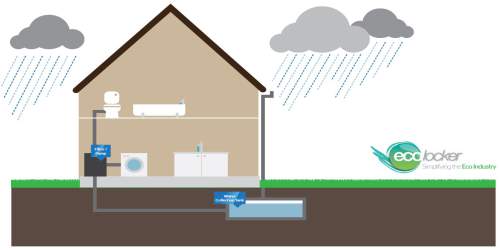Read Time : 3 Minutes
What are the potential uses of recycled rainwater?
Uses of Rain Water Harvesting
The rainwater collection process used in the UK for domestic and commercial premises are not suitable for drinking, bathing or food preparation even though it is filtered before being transferred to the containing tank. For everything else, rain harvested water can be used, including:
- Flushing toilets
- Washing clothes (with a washing machine)
- Watering gardens plants and flowers (via an outside tap)
- Washing cars (via an outside tap)
- Cleaning the exterior of buildings
This means that efficient collection of rainwater can help reduce your water usage and, if you are on a meter, cut down on your utility bill.
Flushing the Toilet
You may be surprised to know that flushing the toilet can account for up to 30% of your total water usage. For a single flush toilet around 13 litres of water are used each time you pull down that handle on the cistern. The average household may well flush the toilet around 5,000 times a year which is a total water usage of 75,000 litres. There are plenty of ways of reducing the amount of water you use in the toilet, as well as utilising rainwater harvesting to act as part of the supply. You can put in a toilet tank bank (an inflatable bag that reduces the amount of water that fills the tank) or opt for a more efficient newer model of cistern that allows you to flush less.
COMPARE PRICES FROM LOCAL INSTALLERS
Compare prices from local companies fast & free
Enter your postcode to compare quotes from leading professionals. We promise to keep your information Safe & Secure. Privacy Policy
Clothes Washing
Old time washing machines used to waste as much as 150 litres in one cycle but those available today are more eco-friendly. Even so, a normal wash can cost you about 50 litres of water and if you have a large family that could build up over the year. With an average of 3 washes a week, that’s another 7,800 litres a year if you have one of the latest machine models. If you are using an old one you could be using up to three times more for your yearly wash. And that’s a lot of water that could be saved through rainwater harvesting. Our tip: Next time you pop out to buy a washing machine then check the water usage and choose the most eco-friendly model.
Other Water Usage
Other areas where you use water can also be helped with a harvesting system, including outside. Of course, a lot depends on whether you are into your garden and water it regularly. As a guide, putting a water sprinkler on for just an hour will use around 1,000 litres which equates to the average for a family of four over a couple of days. If you are giving your car a wash it can take up to 500 litres a go and giving the walls a rinse down can cost you just as much. If you tot up the number of ways in which we use water other than for drinking or bathing, then the amount that could be saved from water harvesting starts to become significant.
Commercial Water Harvesting
For businesses and industry the uses of rainwater harvesting remain the same as domestic, including laundry, watering gardens, toilet flushing and cleaning. Water for businesses is becoming an increasingly expensive proposition with sewerage and trade effluent charges rising and an efficient rainwater harvesting system can help reduce costs by as much as 50% when it is combined with other water saving measures.
Water Availability during Droughts
According to the scientists, there is no doubt that climate change is causing more extremes in weather conditions for the UK. Whilst we’ve had to endure some very wet conditions we’ve also had a number of occasions when there has been very little rainwater for months on end. This not only happens in the summer but in the winter as well, leading to low reservoir levels and the imposing of usage restrictions. For commercial and domestic properties, one of the important uses of rainwater harvesting in the future may well to be to ensure that our mains usage is optimised by using saved water for jobs such as laundry and watering the garden.
Why do we need to Conserve Water?
Making use of rainwater harvesting is not just about reducing the costs and making sure you have enough supply to keep you going through the drier periods. Whilst 70% of the earth’s surface is covered by water, only about 1% of it is actually drinkable. Demand is increasing as the population grows and supply may well dwindle at times due to climatic conditions. If the science is right, by 2030 the demand will outstrip supply by about 40% which means we all need to play our part in doing something about it. There are ways to conserve water without investing in a rainwater harvesting system, such as installing a meter and taking a bigger interest in the amount you use.
- Putting in a toilet tank bank to reduce the amount of water used in each flush is one idea. This is just an inflatable bag that reduces the amount of space in your cistern.
- Keeping showers down to a maximum of 4 minutes can also dramatically reduce the amount of water you use.
- Putting a water butt in the garden can help you cut down even more.
Whilst we are not likely to turn into a sub-Saharan country, the prospect of dwindling water supply and greater demand does mean that we all have to box a little clever. Rainwater harvesting presents a useful long-term solution to reducing the demand on our mains supply and, for many households on a meter, it can also help to cut down those all-important costs.
Find a local installer
Welcome to the biggest directory of UK renewable energy companies





 Types of Rainwater Harvesting System
Types of Rainwater Harvesting System


